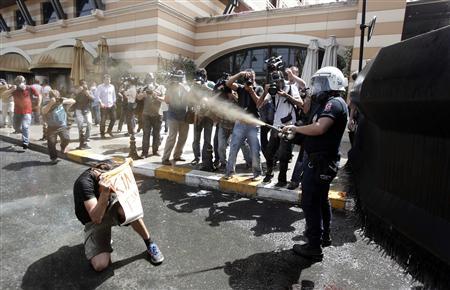Anti-government protests continue in Istanbul

Riot police recently clashed with tens of thousands of May Day protesters in Istanbul. There have also been protests against the government`s stance on the conflict in neighbouring Syria, a recent tightening of restrictions on alcohol sales and warnings against public displays of affection.
Police staged a dawn raid on demonstrators who had been camping for days in Gezi Park in anger at plans to build a shopping mall, and clouds of tear gas rose around the area in Taksim Square that has long been a venue for political protest.
"We do not have a government, we have Tayyip Erdogan...Even AK Party supporters are saying they have lost their mind, they are not listening to us," said Koray Caliskan, a political scientist at Bosphorus University who attended the protest. "This is the beginning of a summer of discontent."
The Istanbul Medical Chamber, a doctors` association, said at least 100 people sustained minor injuries on Friday, some of them when a wall they were climbing collapsed as they tried to flee clouds of tear gas.
Amnesty International said it was concerned by what it described as "the use of excessive force" by the police against what had started out as a peaceful protest.
Erdogan has overseen a transformation in Turkey during his decade in power, turning its economy from crisis-prone into Europe`s fastest-growing. Per capita income has tripled in nominal terms since his party rose to power.
He remains by far Turkey`s most popular politician, and is widely viewed as its most powerful leader since Mustafa Kemal Ataturk founded the modern secular republic on the ashes of the Ottoman Empire 90 years ago.
The unrest has been far from the sort of mass demonstrations seen in other parts of the Middle East or even parts of Europe in recent years, but it reflects growing opposition concern about Erdogan`s authoritarianism.















































